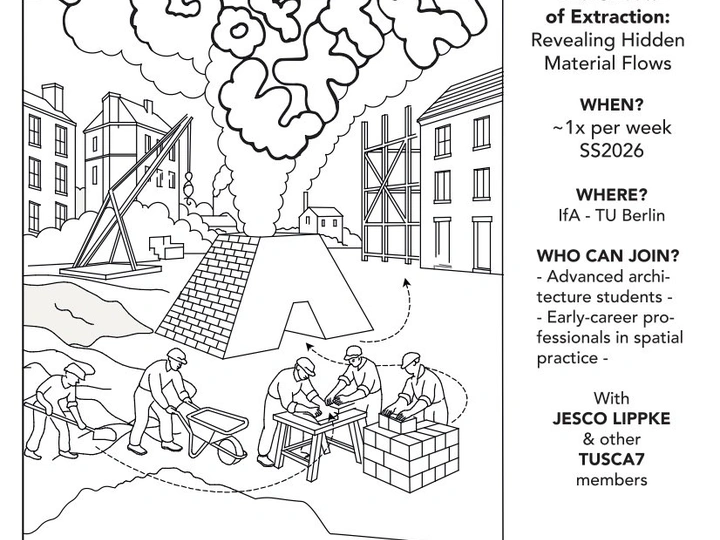The Ghosts of Extraction: Revealing Material Flows

TUSCA7 Berlin is a transdisciplinary collective of researchers, designers, and academics exploring diverse dimensions of architecture, urbanism, and ecology. Originally founded within TU Berlin, the group creates collaborative formats—research studios, workshops, and exhibitions—that interrogate spatial practices through critical mapping, public pedagogy, and infrastructural research. Current members are based between Berlin, Geneva, and Vienna, maintaining active links to academic institutions, civic initiatives, and architectural networks across Europe. TUSCA7 Berlin emerged as an internal association at TU Berlin and continues to organize teaching formats and curatorial interventions within and beyond institutional frameworks.
Jesco Lippke is an interdisciplinary urban researcher with a focus on the environmental history and political economy of construction. He holds an M.Sc. in Urban Design from TU Berlin and a B.Sc. in Architecture from HafenCity University Hamburg. His current research investigates the global material regimes of the construction industry, drawing from environmental history, political ecology, and critical urban studies. His master’s thesis examined the externalization of socio-ecological costs along the aluminum supply chain, connecting mining in Guinea to material choices in the German building sector. Building on this work, Jesco is preparing a PhD project that traces the historical formation of London’s built environment through the lens of metabolic shifts and global material displacements. The Ghosts of Extraction extends this research into a more public and experimental domain: combining collective pedagogy, fieldwork, and spatial investigation, the project turns analytical insights into a collaborative learning process for future practitioners. Both the research and the learning module are guided by a historical-materialist interest in how architectural forms mediate the displacement of labor, energy, and environmental costs.
The Ghosts of Extraction is a research-driven peer-learning module that investigates the hidden material histories and socio-ecological displacements that underpin contemporary architecture. It starts from a simple observation: construction is one of the most materially intensive and environmentally destructive industries today, yet architecture often fails to confront the real-world consequences of its material choices.
Through a structured yet creative methodology, the module traces the connections between buildings and the extractive geographies that sustain them. Participants work through four phases: (1) observing a building’s material presence, (2) tracing supply chains to extraction or production sites, (3) analyzing the displacement of environmental and social costs, and (4) reflecting on how these insights could reshape architectural thinking and practice.
We begin in Berlin with a brick building and an excursion to Ziegeleimuseum Glindow, a former early industrial brick production site that once supplied materials to Berlin and Potsdam. This anchors the method and allows participants to engage concretely with the historical co-evolution of architecture and extraction.
Further modules are planned in the Czech Republic (contemporary mining), Lausanne (imported soils and landscape design), Tbilisi (demolition and landfilling), and London (19th-century brick industry and fossil capitalism, in collaboration with the Royal Academy of Arts).
The goal is twofold: to sensitize students and practitioners to the socio-ecological entanglements of the built environment, and to develop a rigorous, historically grounded methodology for investigating and visualizing these “ghosts of extraction.” While adaptable in format (seminar, studio, workshop), the module centers analytical clarity and material consequences, drawing from environmental history, political ecology, and materialist theory to make hidden structures visible and discussable.